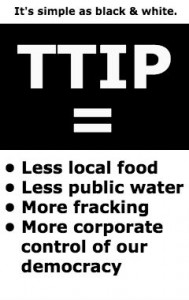 When negotiating major trade agreements, the European Commission seeks formal input about the impact of these agreements on the economy, human rights and the environment. It does so by commissioning a Sustainability Impact Assessment. For the ongoing negotiations about the EU-US trade deal, the Transatlantic Trade and Investment Partnership (TTIP), they entrusted Ecorys with this task. The consulting company just recently published its draft Interim Technical Report on the Sustainability Impact Assessment (SIA).
When negotiating major trade agreements, the European Commission seeks formal input about the impact of these agreements on the economy, human rights and the environment. It does so by commissioning a Sustainability Impact Assessment. For the ongoing negotiations about the EU-US trade deal, the Transatlantic Trade and Investment Partnership (TTIP), they entrusted Ecorys with this task. The consulting company just recently published its draft Interim Technical Report on the Sustainability Impact Assessment (SIA).
We had a closer look at this report and there are several things in it that we are quite concerned about.
The report fails its purpose of properly informing the negotiators of the possible consequences of the trade agreement and obviously plays down the potential environmental and social impacts of the TTIP. We estimate the impacts of the Transatlantic Trade and Investment Partnership to be much higher and it is a shame that the consultancy trivializes many worrying facts about the trade deal.
We all heard about chlorinated chicken, the threat of genetically modified organisms and the Investor-State Dispute Settlement (ISDS, which allows companies to challenge foreign laws), that reappeared some time ago only very slightly transformed as the so-called “Investment Court System”. What we talk about far less is the fact that under the TTIP, our European energy system would also face big changes. And no, those changes are not for the better, neither for us nor for the global climate.
This leads to the most striking thing about the draft report: Where is the outcome of the COP21? Where is the global Paris agreement, the strongest worldwide deal tackling climate change in our history?
The report hardly makes any reference to the Paris agreement, but both the EU and the US are significant emitters of greenhouse gases that are supposed to ratify the COP21 agreement.
The purpose of the report is to inform the public and the Commission about the potential impact of the TTIP on the economy, environment and human rights. Let’s be clear that non-action on climate change will result in a significant rise of the amount and severity of natural disasters, aggravating and creating crises in countries contributing least to the warming of the planet. So far, the SIA mentions that through the TTIP, greenhouse gas emissions are expected to rise, but no word about what this means for the 1,5 degree goal of the Paris agreement. And not even a hint of the serious impact global warming will have on our food system, societies and ecosystems.
Coal has a dirty little brother
Talking about greenhouse gas emissions: we know that the big culprit is coal. What few know and what is played down with great costly lobbying effort by big business, is that coal has a little brother: gas. Particularly fracked gas. Even more s,o fracked gas that is being liquefied to minimize its volume, making shipping it to the EU easier.
The export of fracked gas will be facilitated through the TTIP. The authors of the SIA report consider liquefied natural gas (LNG) cleaner than coal. Given the fact that methane and other emissions throughout the life-cycle of fracked gas still spell climate disaster, calling LNG a “cleaner fuel” is purely cynical. Still, the SIA report does so, and estimates a rise of LNG import without mentioning the big setback it would have on our climate ambitions.
But what about fracking in the EU?
TTIP is taking “care” of that as well: Big oil and gas companies are literally hovering over TTIP, providing input to its energy and raw material chapter of the text and hoping for an increase in fossil fuel exports through the treaty. And indeed, TTIP will make it in many ways easier for big corporations, be it European ones or those from the US: About 75.000 companies, among them several big oil and gas corporations, have subsidiaries allowing them access to the remodeled ISDS – the Investment Court System. This means that they could sue governments if they ban fracking, strengthen their environmental and health standards or regulate fossil fuel extraction in any way that could make the company lose profit. This not only leads to a parallel legal system for investors, but also to lawsuits involving enormous sums of money, intimidating governments and forcing them to think twice the next time they want to introduce laws protecting our health, air or water. The waiver of states to protect their citizens and the environment, the so-called “regulatory chill”, is mentioned in the SIA report, but the significant impacts it could have are played down.
The moral of the story
An energy chapter, closely “supervised” by big business—a step towards opening the EU’s gates for dirty fracked LNG—and an Investment Court System pretending not to be the dreaded ISDS that allows European states to be sued by corporations when they attempt to ban fracking will bring negative impacts to the EU that the report simply does not reflect.
The report, in its current form, is an inadequate Sustainability Impact Assessment that trivializes the serious influence of TTIP on our human rights and environment that are, unfortunately, estimated to be very high.


